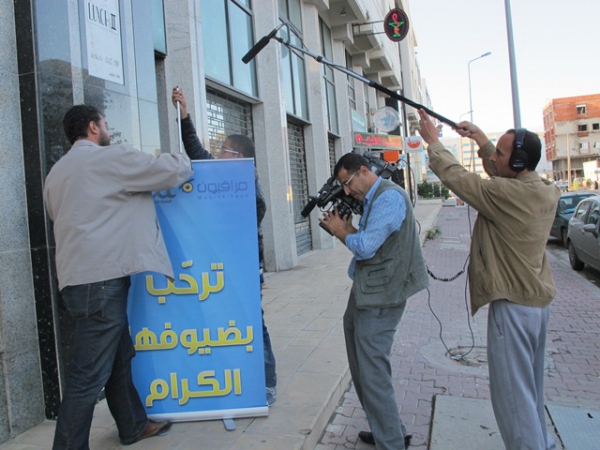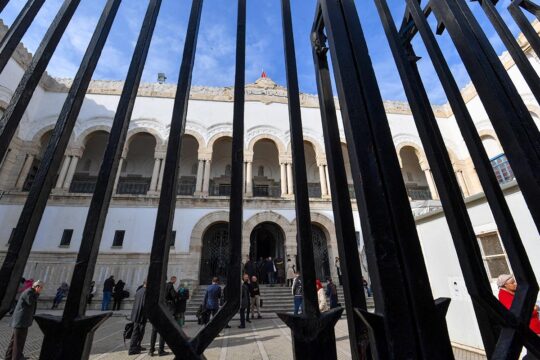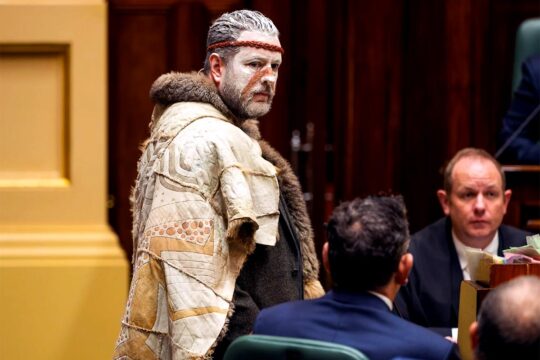Larbi Chouikha is a professor at the Press and Information Sciences Institute at Manouba University, Tunisia, and author of a book entitled “From the legacy of State control to the uncertainties of the transition: The difficult transformation of the media”*. He has been researching and writing on the media for 30 years. Professor Chouikha, who has just co-authored “A History of Tunisia since Independence” with Eric Gobe (Editions La Découverte) has also been a member of the National Authority to Reform Information and Communication (INRIC).
Justice.Info.Net: As you say in your book, the media sector is currently characterized by changes “from the grassroots”, brought about by the revolution. Is that unprecedented in Tunisia?
Larbi Chouikha: Tunisia’s history from independence up to January 14, 2011 has been marked by what Michel Camau calls “ebbs and flows”. Whenever there was a social crisis challenging the legitimacy of State institutions, the authorities would loosen up a bit in the political and media sphere, for as long as it took them to return to their old reflexes and tighten up again. These moments of opening up were always dictated from above, from the highest authority of the State, for example in 1970 after the failure of the experiment with land collectivization; in 1977 when there were rising tensions between the authorities and the trade union movement; in 1981 after the Gafsa coup and the advent of multiparty politics; and of course in 1987 after President Bourguiba was ousted by Zine Abidine Ben Ali. Each time this “loosening of authoritarian rule” was accompanied by an upsurge of professional journalism and new freedom of approach, sudden rehabilitation of journalistic genres, caricature, new independent and opposition newspapers. But what happened on January 14? Since political change had been brought about by the “grassroots” without being managed by a leadership, Tunisia passed from one day to the next from an omnipresent State to an unprecedented weakening of State authority. The situation was unprecedented. The State completely disengaged itself from the media sector, scrapping the Press Code, the Ministry of Communication and the Tunisian Agency for External Communication (ATCE). That left a void, and there were media excesses, notably on the television, hence the creation in March 2011 of the National Authority to Reform Information and Communication (INRIC). In the absence of a military force crisscrossing the country to maintain control, as in other regions of the Arab world where transitions have been aborted, everything remains possible in Tunisia. That is why the country represents a real test case, including in the media sector. We can try everything and its opposite!
Justice.Info.Net: Why did the drive for media reform, which marked the first transition period from January 14, 2011 to the elections of October 23, 2011, stop with the installation of the Constituent National Assembly in December 2011?
LC: Let’s say rather that the drive went astray, was diverted or put off. After the October 23 elections, the country entered a phase of political, social and identity-related polarization between the conservative camp and the secular camp. This not only led us off the path of media reforms but also nearly sparked a civil war. Also, the Islamists, who dominated the post- October 23 period have no culture of democracy. Let us not forget to what extent the leaders of the Ennahdha movement bore a grudge against journalists who in trying to break with propagandist practices had distanced themselves from the authorities. However, civil society, which is a key player in the transition, was once again dynamic and remarkable. It was civil society that saved the reform process, by supporting massively the journalists’ general strike on October 17, 2012. The strike was against attacks on the media and to call for application of decrees 115 and 116 on the new Press Code and creation of an independent broadcasting regulator. The government announced the same day that the two laws in question would be implemented.

LarbiChouikha
Justice.Info.Net: You explain in your book that both the singularity and fragility of the Tunisian transition stem from its incapacity to break entirely with the practices and scenarios of the past. How does this particular situation impact on the media?
LC: The big problem at this level is the fact that transitional justice took so long to start in Tunisia. It should have been launched just after January 14. Today, the men of the old regime, who are highly present in the media, think their cases have been shelved, and we see them returning to the television and especially the newsrooms where there’s a lot of confusion and tension because of the cohabitation of two different worlds. That is, the world of the old guard, who are very well equipped because they have expertise and political and financial networks; and that of the young, the orphans of the transition, who are in the minority, lack training and support, but who expect reforms. Today, in the absence of fundamental reforms in the media, Tunisia is at a turning point: either we save the face of the transition or we return to the practices of the past. In that case, we would go back to the old cycle of clamping down/ opening up a bit.
Justice.Info.Net: How do you envisage media reforms? And who can initiate them?
LC: Only a heavyweight like the government can initiate these reforms, which need to include not only laws but also journalistic practices. We need to envision a new system of media that breaks with authoritarianism. We can do it, especially by calling on the support of civil society and adapting international expertise in this field to Tunisian social reality. Media reforms can also be part of the Tunisian experiment.
Justice.Info.Net: How do you explain that the broadcasting sector is almost a monopoly? Is it because of entry into the sector of private businessmen who are close to either the Islamists or Nidaa Tounès, the party currently in power in Tunisia?
LC: It’s not particular to Tunisia. It also happened in Eastern Europe during the transitions there when those with money took advantage of the new freedoms to invest also in the media. But this raises a question: why does this sector attract only businessmen close to the circles of power? Where are the progressive voices, the ones that could offer the public more than just eternal talk shows and political debates where people get over-excited? Why are there still no investigative reports on television ?
Justice.Info.Net: What do you see as the threats to freedom of expression in Tunisia today?
LC: Lots of things. The legal framework is still a problem. Some articles of the Penal Code that were not removed after the new Constitution was published can still get journalists convicted for “undermining public order”. The bill on “repression of attacks on the armed forces” submitted to the Assembly of People’s Representatives (ARP) provides for heavy sanctions for “insulting” the security forces. This draft law could seriously lead journalists to reactivate their censorship and self-censorship reflexes, because it provides that they could be sent to jail. The terrorist threats that weigh on the country can also be used against journalists to put public opinion against them. These risks are certainly real, but it is up to the journalists to evaluate them properly in their newsrooms and avoid sensationalism and hunting for a scoop at all costs when it comes to terrorism. Threats to freedom of expression can also come from journalists themselves if they lack professionalism and ethics!
*Larbi Chouikha: “La difficile transformation des médias. Des séquelles de l’étatisation aux aléas de la transition ”, Tunis, 2015, 115 pages. Published with the support of the Civil Society Coalition for Freedom of Expression and International Media Support.






